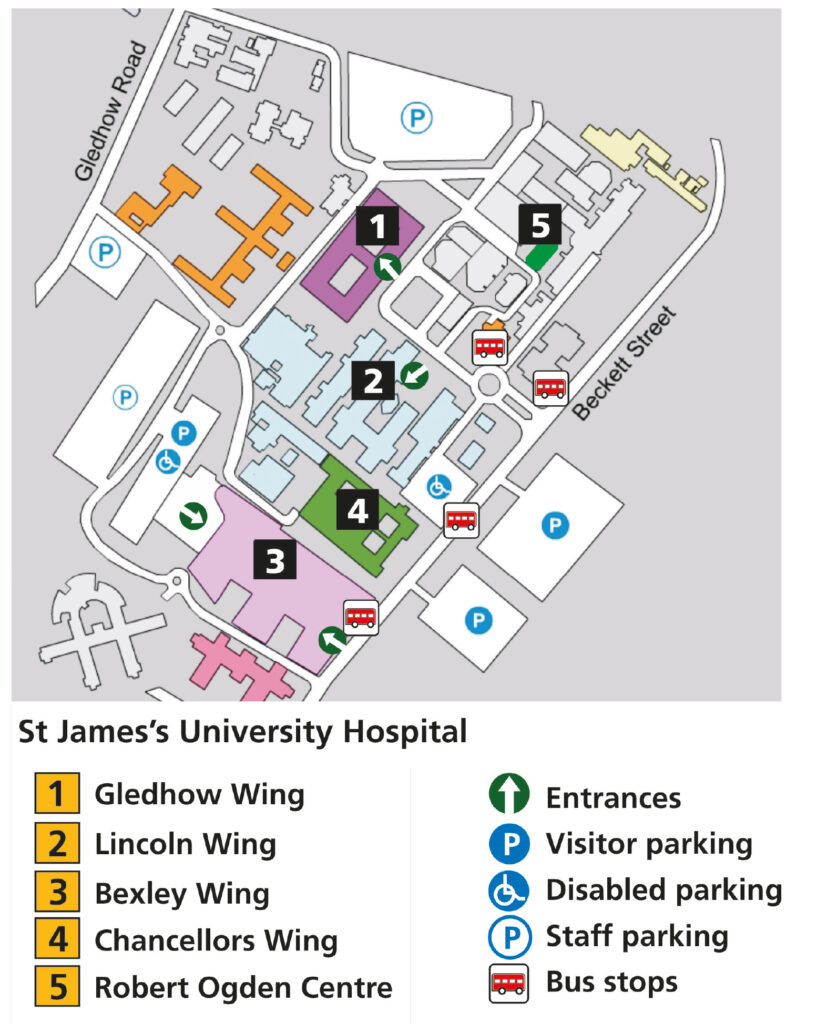This leaflet aims to help you and your family understand more about your treatment for lung cancer. The treatment technique used is Stereotactic Ablative Radiotherapy (SABR).
It will be given in addition to the information you will receive from your clinical oncologist (who is a specialist doctor in cancer treatment). Their team will be caring for you during your treatment. This team will include therapeutic radiographers and lung cancer nurse specialists. If needed, they can also refer you to other health care professionals.
The leaflet describes radiotherapy planning and treatment. It also explains the side-effects which you may experience during and after treatment.
Each person’s treatment will vary, so the information given is a general guide. The Healthcare team looking after you will explain your treatment and the side-effects in detail. If you have any questions after reading this leaflet, please speak to the team looking after you or ring the numbers at the end of the leaflet. Staff will make every effort to meet your individual needs or will direct you to the person who can help.
All your radiotherapy planning and treatment will take place in the Radiotherapy Department on Level -2, Bexley Wing, Leeds Cancer Centre (LS9 7TF). Radiotherapy reception telephone number: 0113 206 8940
Please do not bring valuables into the hospital with you as the trust cannot accept liability for loss or theft.
What is Lung Stereotactic Ablative Radiotherapy (SABR)?
Lung SABR is a radiotherapy technique which delivers a high dose of radiotherapy to a small area of the lung.
A high dose of radiotherapy is given at each treatment visit, therefore fewer treatments are needed in total. However, each treatment session will be longer than in standard radiotherapy treatment.
Radiotherapy is the use of carefully controlled high energy X-rays to treat cancer. Treatment is given in such a way that it destroys cancer cells while doing as little harm as possible to normal cells. When you are having radiotherapy you do not feel anything and it does not make you radioactive. It is perfectly safe for you to be with other people, including children and pregnant people, during the course of your treatment.
You will have your radiotherapy on a treatment machine called a linear accelerator as shown in the photograph here.
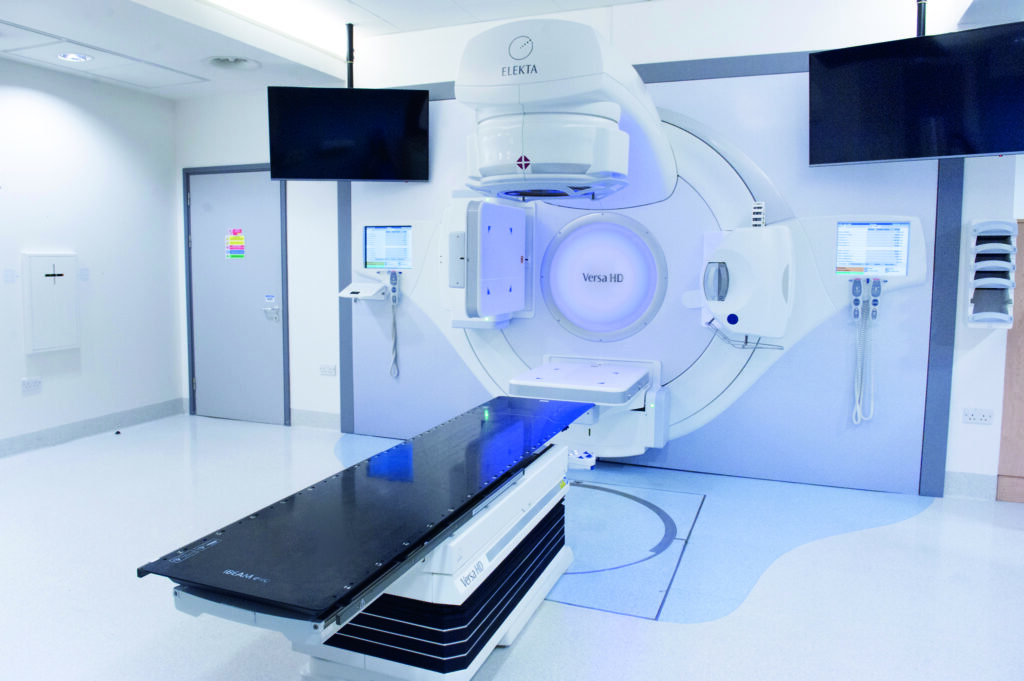
If you would like to visit the radiotherapy department before your treatment starts please call 0113 206 7603 to arrange a time. This visit can be very useful as you can find out more information about radiotherapy.

Who will I meet?
Therapeutic radiographers
Radiotherapy is given by therapeutic radiographers of any gender, who are highly trained in the accurate delivery of radiotherapy treatment. You will see your radiographers at each treatment session and they will be happy to answer any questions you may have.
Student therapeutic radiographers
The radiotherapy department is a training centre for therapeutic radiographers. They are supervised at all times. If you do not wish students to be present, please speak to a member of staff. This will not affect your treatment or care.
Others involved in your care
You may meet other staff whilst you are coming for radiotherapy. Everyone you meet will introduce themselves, tell you their job title and explain the role they have in your care.
Pregnancy
It is very important that patients who can become pregnant, are not pregnant at the start of a course of radiotherapy. Also, do not become pregnant during a course of radiotherapy because it can have an effect on the unborn child. Use an effective form of contraception, for example condoms, coil, depot injection or contraceptive pill.
For more information see the ‘Contraception and pregnancy during cancer treatment’ leaflet. Please do not hesitate to ask your doctor or nurse if you have any questions or concerns about these issues.
Planning your treatment
Your clinical oncologist or a member of their team will discuss your treatment with you at your outpatient visit. You will then have one or two visits to the radiotherapy department before actually starting your treatment.
If you have not signed a consent form in clinic when you met your oncologist, the first of these appointments will be in the Princess Royal Suite on Level -2. You will have the opportunity to discuss the treatment again and will be asked to sign a consent form giving your consent to treatment. It is a good idea to bring a list of any questions you may have and an up to date list of all your medication. Your first visit can be lengthy and may take up to two hours.
You may want to bring something to eat and drink and something to occupy yourself with.
During these visits we will gather all the information we need to accurately plan and deliver your treatment.
Treatment position and scan
In order to plan your treatment you will have a planning CT scan. This is done on a machine called a CT Simulator. This is a CT scanner that allows the images to be sent to the radiotherapy computer planning system.
4D Scan
Sometimes we need to monitor your breathing during the scan, so a belt is placed around your stomach which is attached to the scanner to monitor you. This type of scan can take longer, lasting 30 minutes.

Planning scans are not diagnostic examinations and will not be reported on as such.
You will be asked to lie with your arms above your head, in a position that is comfortable for you (shown here in the photograph).
The radiographers will help you with this. The position is made more comfortable by using a custom made bag to support your back and arms.
Some patients find it difficult or uncomfortable to keep their arms above their head, for example if they have arthritis. If you think that this might be a problem for you, please discuss this with your clinical oncologist. Painkillers taken ½-1 hour before each treatment can help. Your clinical oncologist can prescribe these if needed.
Patients receiving radiotherapy to the upper lung, and some patients who are unable to keep their arms above their head, may be treated wearing a plastic mask, as shown in the picture.
This mask is then worn during the Planning scan and during treatment.
A separate leaflet is available explaining the mask making process. If you have not been given one please ask.
If you have any concerns about the mask, please let your doctor or a member of the radiotherapy team know. We have a support team who will be able to help you.
Once you are in a suitable and comfortable position, the radiographers will draw some marks on you, to be used as a reference for your treatment. This is the position you will be in for your treatment.
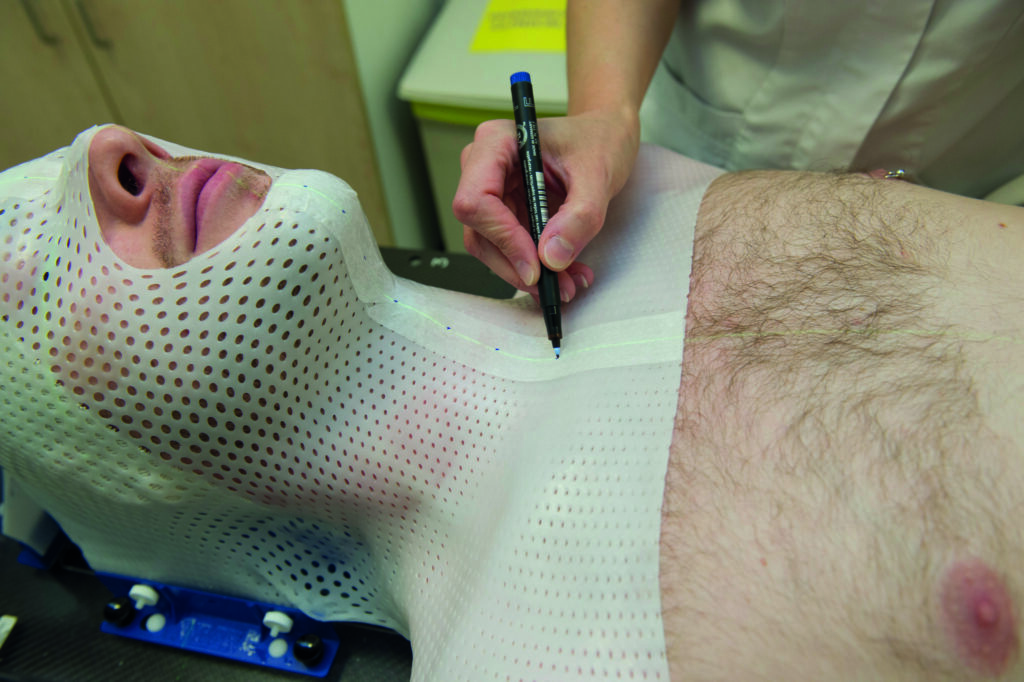
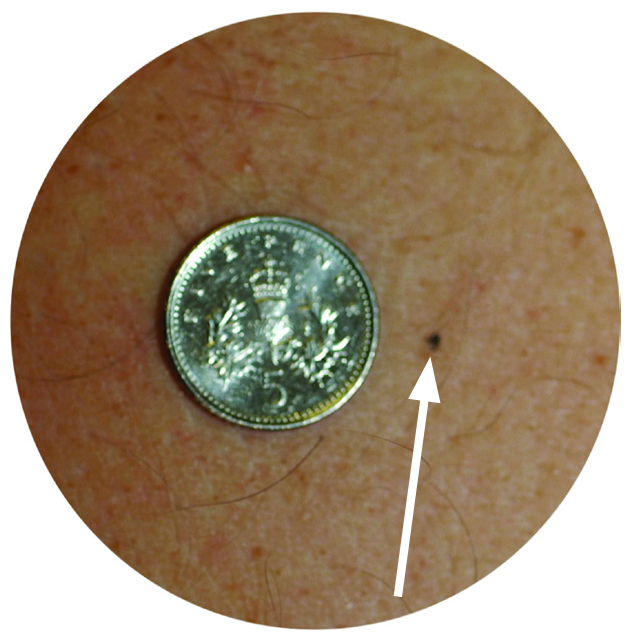
You will then be scanned, which will take between 5 to 30 minutes and at the end of the scan the skin mark will be replaced by a small permanent mark (tattoo).
These permanent marks help us to ensure that you are in the same position each day. It also means that you can wash without worrying about your marks coming off.
Your treatment appointments
SABR treatment can be given in three, five or eight treatments. Although we can sometimes predict in advance the number of treatments you are likely to receive, this may change once we have produced your individualised treatment plan.
Treatment is usually given two to three times a week and is not routinely delivered at the weekend. The first day of treatment may be the longest appointment as more checks are made to make sure the treatment is accurate.
It is possible that during your course of treatment an appointment may be cancelled due to planned maintenance, bank holidays or in rare cases, machine breakdowns. For SABR treatments, gaps of several days between treatments are allowed when necessary.
Your appointments for radiotherapy may not be at the same time each day and may be subject to change.
As your last day of treatment may be flexible please do not book a holiday immediately following your treatment.
Please telephone the radiotherapy reception desk on:
0113 206 8940 for further advice.
Having your treatment
When you arrive for your treatment you should go to the radiotherapy main reception desk at the entrance of the radiotherapy department. On the first occasion you will be given all your appointments. You will then be escorted to the waiting area for your machine. The radiographers will explain what will happen and answer any questions that you may have.
A team of radiographers work together in the treatment room and you will hear them giving each other instructions and information relating to your treatment. At each treatment session, the radiographers will position you accurately, moving the treatment couch and machine to direct the treatment at the cancer. The machine will not touch you. During treatment it is important for you to stay as still as possible but to breathe normally.
Once you are in the correct position the radiographers will leave the room to begin treatment. They will be watching you all the time on a closed circuit TV monitor (CCTV) to check you are ok during the session. The CCTV camera is not recording or saving any images.
There is also an intercom system so the radiographers can talk to you. Please let the radiographers know if you would like to use the intercom system.

Each treatment session will take around 20 minutes. As well as delivering your radiotherapy the radiographers will always take a number of ‘scans’ before your treatment.
The only purpose of these scans is to confirm that your treatment remains accurate throughout and they may result in small adjustments being made to the position of the couch and machine.
When delivering the treatment itself the machine will rotate around you and make a high pitched noise. This is the only way you will know the machine is switched on. You will not feel anything. If you have any concerns or queries throughout the treatment course, please tell the radiographers.
After the treatment is complete the radiographers will come back into the room and help you off the couch.
Your treatments will generally be on the same machine, although there may be days when this machine is being serviced and your treatment will be in a different room.
On some days the radiotherapy department may be busy and there may be a delay before your treatment. We will keep you informed of any delays over 30 minutes. Please see the delay signs in the waiting areas. It may be a good idea to bring something to eat and drink with you, including any supplement drinks you have been asked to have and any medication you may need.
It is very important that you do not miss treatment days as it may make your treatment less effective. If you feel you are unable to attend for any reason please telephone us so that we can discuss this with you. If you have any queries about your appointment times please discuss these with the radiotherapy coordinators on your treatment unit. For appointment queries please telephone the radiotherapy reception desk 0113 206 8940 for further advice.
Follow up after your radiotherapy
6-8 weeks after treatment the lung cancer care co-ordinator will call you to see how you are and if you have experienced any side effects from your radiotherapy.
12 weeks after treatment has finished
You will receive an appointment to meet with your oncology consultant. ‘Please arrive 30 minutes earlier and report to the radiology department on level 0, Bexley Wing for a chest X-ray. After this, please attend your consultation as arranged.
6 months after your treatment
You will receive an appointment for a CT scan. Following the scan you will receive a clinic appointment to discuss the results.
Side-effects of treatment
As your treatment progresses you may experience some side-effects. Not everyone will experience all of these effects. Do not worry if you develop any of the following early reactions. They usually begin about halfway through the course of treatment, may last for several weeks after it has finished and then slowly settle down.
Please tell the radiographers how you are feeling particularly if your symptoms worsen, so that you can get the care you need.
Early Reactions (During or up to 12 weeks after your treatment)
Skin reaction
The skin in the treated area may start to redden or darken around 10 days after starting your radiotherapy. It may become dry and itchy. For a very small number of patients, it may peel and become weepy. Before you start your treatment, a radiographer will explain what could happen to your skin and how to look after it. They will also give you a leaflet to take home.
If you are concerned about your skin reaction, please talk to your radiographers or contact the review clinic nursing staff in the Princess Royal Suite, telephone 0113 206 7587.
Please be aware that smoking can make skin reactions worse.
Tiredness (fatigue)
Radiotherapy can make you feel more tired than usual, especially if you have to travel a long way for treatment. Fatigue usually starts by the end of treatment and is worse for the first six to twelve weeks after treatment.
Fatigue usually improves between six months to a year after treatment. Some people find that fatigue can last longer, up to two years or more.
There are things you can do to help yourself:
- Exercise can help reduce the symptoms of fatigue.
- Having enough to drink can prevent tiredness from dehydration.
- Small meals or snacks eaten more often than three times a day may be easier to face.
- Try to get a good night’s sleep where possible, a daytime nap may help.
- Try to ‘pace’ yourself, listen to what your body is telling you, rest if you need to.
- Pick out the things that you enjoy, and try to accept help for some other tasks.
- Little and often is the rule of thumb.
There is a Macmillan information leaflet available ‘Coping with fatigue’. If you would like a copy, or support with your fatigue please ask a member of staff.
Chest Discomfort
Some patients can experience pain/discomfort after this type of radiotherapy treatment. This is usually mild and relieved with simple painkillers, such as paracetamol.
If the pain is more severe please speak to your radiotherapy treatment team, their number is on your appointment letter.
If you need to contact somebody through the night or over the weekend or bank holiday then please contact your lung cancer nurse specialist or the clinical oncology nurse-bleep holder at Leeds Cancer Centre via the St James’s University Hospital switchboard on
0113 243 3144.
Loss of appetite
Your appetite may vary during your treatment. Try to eat well and drink about two litres of fluid every day during your treatment. There is a leaflet available ‘Eating well during your treatment’, please ask a member of staff if you would like a copy.
Shortness of breath and/or cough
Occasionally radiotherapy to the lung can produce swelling (inflammation) in the lung tissue. This inflammation or ‘pneumonitis’ can cause symptoms of increased shortness of breath, wheezing and cough and rarely a fever. This usually appears 6-12 weeks after the treatment has finished. It can often be mistaken for a chest infection but it is not helped by antibiotics. Pneumonitis is rare, but if you get these symptoms you must contact your clinical oncologist and/or your lung cancer nurse specialist straightaway as we would wish to see you in clinic as soon as possible.
Pneumonitis can rarely be serious and life-threatening. If pneumonitis is suspected your clinical oncologist will arrange a chest X-ray and sometimes a CT scan. If your clinical oncologist thinks it is indeed pneumonitis then they will start you on oral steroid tablets to help your symptoms and reduce the inflammation.
Later Reactions (after three months)
Lung scarring and collapse
Lung SABR treatment will cause scarring of the lung in the area where the cancer was treated. This scarring is permanent and can cause a small portion of the lung to collapse. The careful planning of your treatment keeps this amount of lung scarring and collapse to a minimum. Sometimes this scarring and collapse can make you become more short of breath. If you are not on oxygen before lung SABR, you may need to have oxygen for a short time. In very rare cases you may need oxygen therapy permanently as a result of SABR treatment.
Very rarely a larger portion of the lung may collapse; this could be life threatening. The risk of this happening is very small.
Chest wall pain and rib fractures
If the tumour is close to the ribs there is a chance that the radiotherapy may weaken the ribs, cause pain and possibly fracture the ribs. This typically happens six months to years after your SABR treatment. Often this does not cause any symptoms and is discovered when you have had a CT scan after the SABR treatment. Rarely these rib fractures can cause pain that requires you to take pain killers, sometimes for a long period of time.
Your Lung Cancer Nurse Specialist Team
Direct Line Telephone – 0113 206 7916
Monday – Friday 9am – 4pm
An answer phone is available – please leave a message
Useful organisations – Local
Leeds Cancer Support
Leeds Cancer Support complements care provided by your clinical team. We offer access to information and a wide range of support, in a welcoming environment for you, your family and friends. The two information lounges both open from Monday – Friday. They are situated on:
Level -2 Radiotherapy Dept. 8am – 6pm
Tel: 0113 206 7603
Level 1 Outpatients Dept. 9am – 4pm
Tel: 0113 206 8816
The Sir Robert Ogden Macmillan Centre
Offers a variety of support services including complementary and supportive therapies.
Open from 9am – 4pm Monday to Friday. Tel: 0113 206 6499
All the Information Care and Support Services mentioned above can be contacted by email on: [email protected]
Useful organisations – National
Macmillan Cancer Support
Freephone 0808 808 0000 8am- 8pm seven days a week.
Website: www.macmillan.org.uk
A textphone service for deaf and hard of hearing people on: 18001 0808 808 0000.
Maggie’s Centre
If you or someone you love has cancer you may have lots of questions. Maggie’s is a warm, welcoming place where you can meet people who are experiencing similar things to you.
You may also be able to find support groups specific to your needs and get advice and information from their professional staff. You don’t need an appointment and all support is free.
Open Monday to Friday 9.00 am – 5.00pm.
Tel: (0113) 457 8364
Address: St James’s Hospital (next to the multi storey car park), Alma Street, Leeds LS9 7BE
Email: [email protected]
Website: maggiescentres.org
Stopping smoking
NHS Free Smoking Helpline: 0300 123 1044 Monday to Friday 9am to 8pm, Saturday and Sunday 11am to 4pm.
Website: www.nhs.uk/smokefree
OUTpatients
A cancer support and advocacy charity for the LGBTIQ+ community.
Email: [email protected]
Website: https://outpatients.org.uk
Hotel Bexley Wing
Patients having radiotherapy or chemotherapy sometimes use the hotel if they have a long way to travel. The hotel is located on the 8th floor of Bexley Wing and offers 19 twin rooms and 1 single room. All have en-suite, tea and coffee making facilities, a mini fridge, towels, hairdryer and digital television. There are two rooms with wheel chair access and a wet room. Patients are able to stay free of charge. There is a charge for relatives if they are staying in their own room.
Meals can be purchased (at breakfast and lunch) if you are able to make your way to the restaurant in the Bexley atrium. At other times you will need to have something you have brought from home or purchased. There is a very small fridge for your personal use. There are no staff after 4pm until the next morning in this facility.
For further details please contact the Hotel Co-ordinator on 0113 206 7687. Out of hours please contact the Non-Surgical Oncology Nurse Practitioner through main switch board on 0113 243 3144.
Car Parking
When you are coming for radiotherapy planning and treatment your parking is free in the on-site multi-storey car park. Please ask for more information at the radiotherapy main reception desk.
How to find us
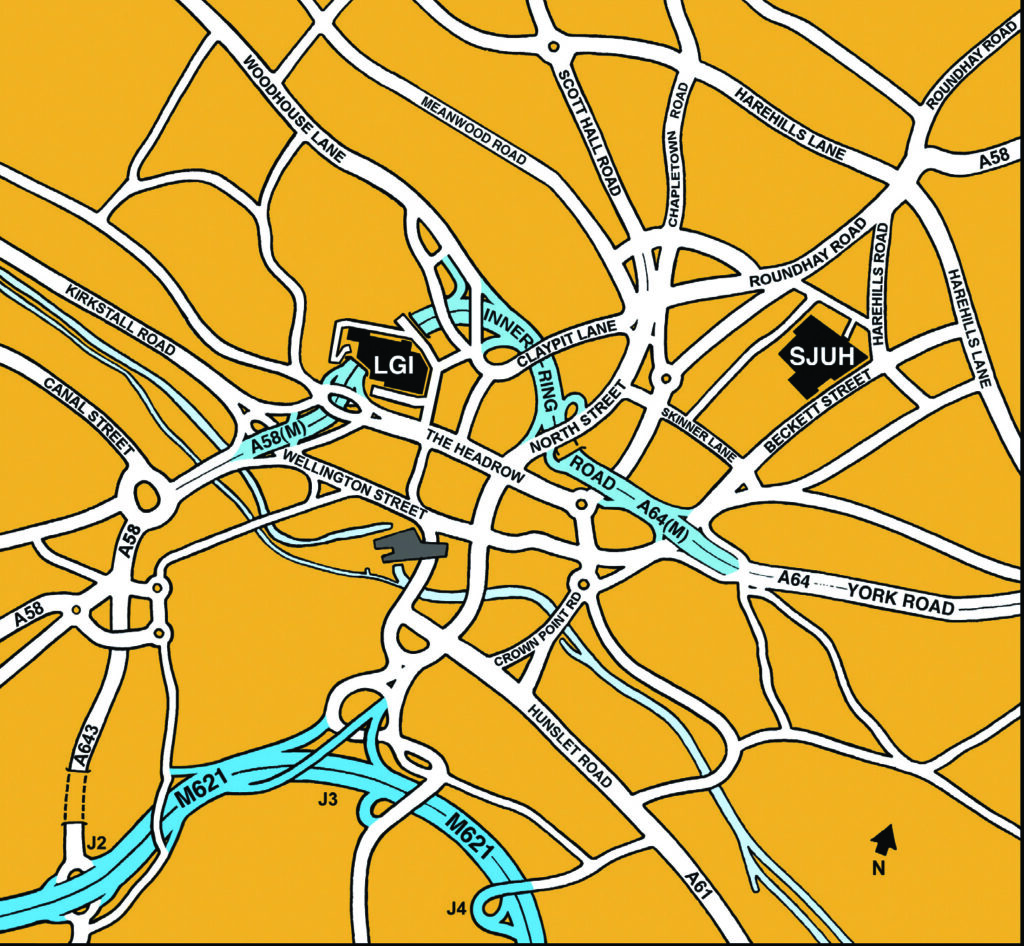
St James’s University Hospital – site plan
